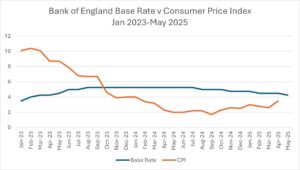
In our weekly Wealth Matters newsletter, we try to keep our readers up to date with developments in financial markets, changes in legislation and financial planning opportunities. In a break from our usual content, we ran a series of articles last year giving an insight into how FAS operates on a day-to-day basis, which proved popular, judging by the feedback we received. Twelve months have passed since the publication of our initial “behind the scenes” articles, and as FAS continues to grow, we would like to bring you up to date with recent developments within the business.
2025 – a busy year!
2025 thus far has proved to be an incredibly busy year for FAS, with the team expanding, and internal systems evolving to continue to meet the highest standards of service. Whilst the business was already growing rapidly, the pace of growth has accelerated even faster this year. It is clear there is an ever-greater need for individuals and businesses to seek independent, professional financial advice. A key driver of this has been the various changes in legislation affecting a range of UK taxes, and an increased awareness of the need to ensure that pensions and investment plans are appropriately managed and reviewed. We have also seen a greater call from clients for individual and tailored advice to ensure that family wealth can pass between generations, reducing or eliminating an Inheritance Tax liability.
To deal with the increased demand, we have expanded our team by 30% over the last twelve months. The adviser, paraplanner, compliance and administration teams have all been strengthened, with experienced and dedicated team members helping to enhance the levels of service we provide to clients. We strongly believe in a collegiate and collaborative approach to our work. All staff are integral to the running of the business and there is a mutual respect amongst colleagues for the role everyone plays.
The team are based within our Folkestone and Maidstone offices, and we believe working closely together in an office environment promotes more efficient administration, and amongst the adviser and paraplanner teams, encourages discussion around planning opportunities, and the outlook for investment markets. Being office based ensures the combined years of experience across the adviser team can work together on complex financial planning scenarios, together with input from our highly qualified and experienced paraplanners.
Growth in the business continues to be fuelled by the client referrals we receive. Many existing clients have been kind enough to pass on our details to friends, family, and colleagues, which is the best compliment we can receive. We also regularly receive referrals from professional firms across Kent, London and the South East, who trust FAS to provide their clients with bespoke financial planning advice.
Procedural upgrades
FAS has not only invested in additional personnel over the past year. We have also continued to invest in technology over the last twelve months, to improve the service we provide. One key enhancement has been the increased use of digital signature systems, which allow clients to electronically sign application forms and declarations. Electronic signatures not only avoid postal delays and ensure rapid processing, but many clients have also commented that they find digital signatures far more convenient. We have also introduced new software solutions that provide detailed cash flow analysis, which help support our retirement planning recommendations.
The FAS Investment Committee work continues to evolve, with enhancements to our research, methodology and investment process. Committee members now schedule more frequent meetings with leading fund managers and have access to a wider range of research and analysis, which continues to expand. The FAS Investment Committee also now provides more regular updates on investment performance and strategy and undertake enhanced analysis to compare investment performance against market peers. The analysis also reviews the open market to ensure that our investment functions provide value for money. In addition, FAS have negotiated fund discounts with leading fund houses, passing on lower fund costs to our clients.
Chartered Status and the Community
FAS is proud of our Chartered status, which is a mark of distinction which signifies a public commitment to professional standards and technical competence. Continuing professional development, whether through further examinations, or regular targeted learning and study, is undertaken by all staff throughout the year. We are fully cognisant of the rapidly changing financial planning landscape and continue to evolve the professional development programme undertaken by the team to meet these challenges.
Links with the local community have also been strengthened over the last twelve months. FAS are a sponsor and key supporter of the Kent Charity Awards, which recognise the amazing work undertaken by local charities. In addition, FAS sponsor the Kent Life Food & Drink awards, and this year, we are also a lead sponsor of the Kent Law Society. We remain proud to be able to support these local events and organisations.
Into the future!
Whilst 2025 has been a year of rapid growth for FAS, we will not lose sight of our core ethos, which prioritises client relationships and focuses on providing quality advice and exceptional service. We are also acutely aware of the need to avoid complacency and will continue to invest in our team and systems to meet growing demand over the months and years to come.
We hope this update has been of interest. We always welcome feedback, so please do get in touch if you have any questions or comments.
















